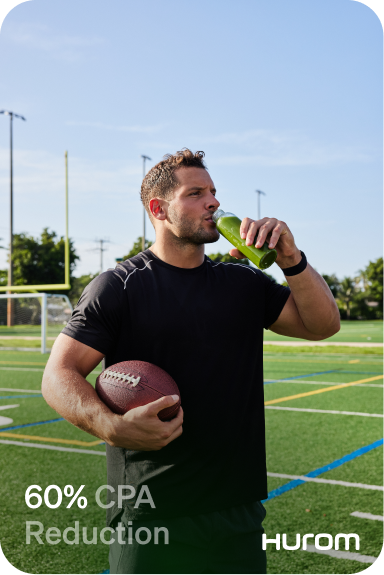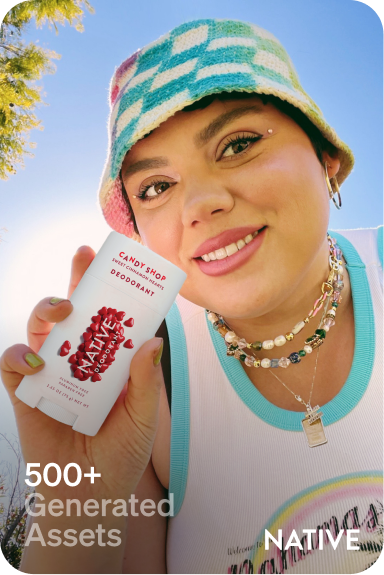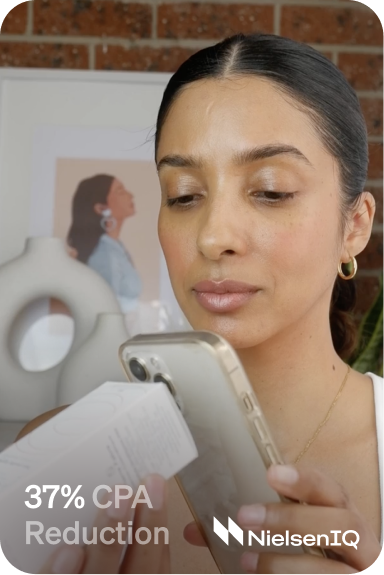Research reveals that 92% of consumers trust influencer marketing more than traditional advertising.
This demonstrates its unique power to build credibility and drive engagement.
With influencer marketing delivering up to 11 times better ROI than traditional methods, over 80% of brands now allocate a third of their marketing budgets to influencer partnerships.
This shift highlights the growing strategic importance of influencer marketing as it connects brands with their target audiences.
In this blog, we explore why influencer marketing is highly effective for businesses.
We’ll cover:
- Influencer marketing – a brief overview
- How influencer marketing benefits businesses
- Real-life examples of brands leveraging influencer marketing
- Future trends in influencer marketing
P.S. Struggling to cut through the noise and build genuine relationships with your audience? At inBeat agency, we specialize in performance-driven campaigns designed to lower customer acquisition costs, increase click-through rates, and deliver results that matter. Our curated network of top influencers creates content that resonates with your audience. Book a FREE strategy call now to discuss your marketing needs!
TL;DR:
- Influencer Trust: 92% of consumers trust influencer recommendations more than traditional ads, making it a powerful strategy for brand credibility and engagement.
- ROI: Influencer marketing offers up to 11 times better ROI than traditional methods, with high engagement and cost-effective partnerships across all budget levels.
- Targeted Reach: Influencers help brands connect with niche audiences, boosting relevance and engagement, especially through micro- and nano-influencers.
- Brand Awareness: Influencers introduce brands at the top of the funnel, using authentic and relatable content that enhances social proof and expands brand visibility.
- Consumer Impact: Influencers significantly shape buying decisions, particularly for younger demographics, by building trust and credibility through relatable endorsements.
- Long-Term Loyalty: Ongoing influencer partnerships, like ambassadorships, cultivate customer loyalty and keep the brand top-of-mind.
- Content Value: Influencers create versatile content that can be repurposed across channels, maximizing ROI and maintaining consistent messaging.
- SEO Boost: Influencer-generated backlinks and social interactions contribute indirectly to SEO, driving traffic and strengthening brand authority.
- Audience Insights: Influencer campaigns provide valuable demographic and behavioral insights, helping brands refine their target audience and strategy.
- Future Trends: Key trends include AI-powered influencers, a focus on authenticity, increasing micro-influencer collaborations, and expanding to platforms like TikTok.
Influencer Marketing - A Brief Overview
Influencer marketing involves collaborating with individuals with a significant and engaged following on social media platforms to promote products, services, or brands.
These individuals, known as influencers, can range from nano-influencers with smaller, niche audiences to mega-influencers or even celebrity influencers with millions of followers.
The goal is to leverage their credibility, reach, and influence to target specific demographics and drive engagement.
Why Is Influencer Marketing Important for Businesses?
Influencer marketing has emerged as a key strategy, with 71% of marketers affirming its positive impact on business growth.
Let’s look deeper into why influencer partnerships are so effective and how they drive meaningful business results.
1. Building Trust and Authenticity
Trust is a cornerstone of successful influencer marketing, but you can’t build it without authenticity.
Research shows that 63% of consumers have more trust in influencers compared to brands.
Here’s how influencers create this trust:
- Influencers’ relatability: Influencers have relatable content that feels genuine and unscripted and, therefore, more trustworthy than traditional ads. This authenticity resonates with followers, which leads to stronger social media engagement.
- Establishing credibility: A lot of influencers are selective about the products they endorse, which is why 74% of consumers have made a purchase after seeing an influencer's product recommendation. This reinforces the effectiveness of well-chosen influencer partnerships.
- The “Borrowed Trust” phenomenon: When brands partner with relevant influencers, they leverage existing trust to connect with a larger audience. As a result, influencer collaboration leads to increased credibility and brand loyalty among followers.
2. Higher ROI and Cost-Effectiveness
Influencer marketing consistently achieves high ROI, with each dollar spent generating an average of $5.78 in earned media value.
This strong return is due to the high level of engagement that influencers drive, which proves it to be a valuable investment for businesses.
Key factors contributing to this effectiveness include:
- Budget flexibility: You can adjust your spending based on goals and budget levels, whether working with mega-influencers for broader reach or choosing micro-influencers for more cost-effective, targeted engagement.
- Attracting quality customers: Nearly 83.8% of marketers find that influencer marketing attracts higher-quality customers who are more likely to convert and stay loyal, which in turn enhances ROI.
- Impact of micro-influencers: Although these influencers have smaller followings, they are more affordable and more effective at engaging niche markets. With engagement rates 6.7 times higher than those of mega-influencers, micro-influencers are ideal for reaching niche audiences in a budget-friendly way.
For example, Soylent, one of our clients, collaborated with us to use micro-influencers to target awareness of new product lines in niches like outdoor activities and gaming. We helped them achieve over 5 million impressions and created 50+ reusable content assets, which enhanced their content calendar.
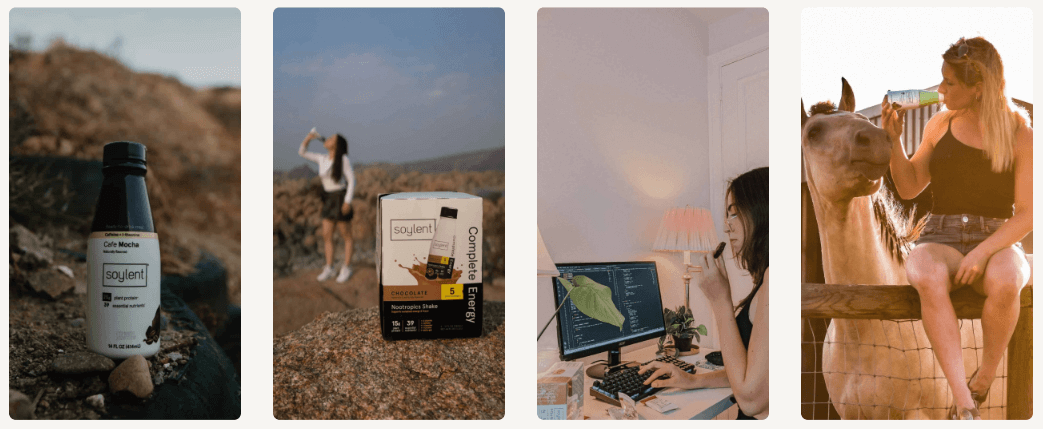
3. Targeting Niche Audiences
Influencers enable you to reach niche audiences with a high degree of relevance.
This precise targeting improves engagement and builds stronger connections with the right customers.
This strategy can benefit you by:
- Reaching specific interest groups: Engaging influencers who focus on areas like wellness, technology, or travel helps ensure that campaigns reach the right audience. This relevance increases the chance of success.
- Increasing engagement with tailored content: Content that aligns closely with a niche audience’s preferences is more likely to generate interaction and build loyalty. Brands benefit from a deeper connection with customers.
- Efficient use of resources: Collaborating with niche influencers allows brands to maximize their budget, targeting a smaller, highly engaged audience likely to convert, which creates a cost-effective solution for specialized campaigns.
For instance, we collaborated with New Balance to target niche audiences by partnering with athlete influencers deeply connected to California communities. They highlighted local stores and new products through videos and photos, creating over 50 unique pieces of content and reaching an audience of 750K.
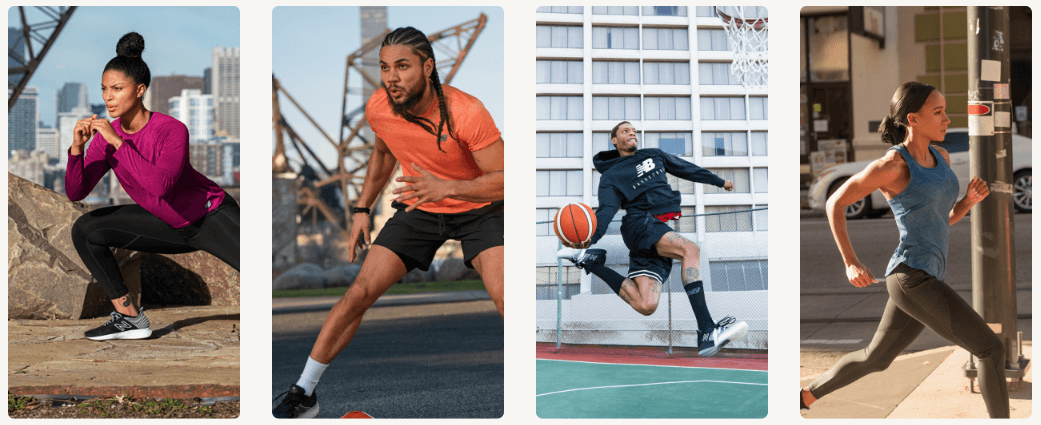
4. Increased Brand Awareness
Influencers are effective in helping brands reach new audiences, establish visibility, and gain credibility.
Their position within social media makes them highly effective in creating awareness for brands aiming to expand their customer base. In fact, 78% of marketers consider influencer marketing an effective method for building brand awareness.
Let’s examine how influencers enhance brand awareness and credibility:
- Top-of-funnel marketing: Influencers introduce brands to their followers at the beginning of the customer journey. This early exposure builds awareness by presenting the brand in everyday, authentic contexts that resonate with audiences.
- Social proof: 63% of consumers report being more inclined to purchase a product when a trusted social media influencer recommends it. This trust translates into credibility for the brand, as audiences are more likely to view it as reliable. As a result, brand awareness grows, supported by the influencer’s established reputation.
- Expanding to new markets: Collaborating with influencers across different niches allows brands to connect with varied demographics and geographic regions. This partnership helps brands gain visibility among audiences with specific interests and expand their reach beyond conventional advertising channels.
5. Driving Purchase Decisions
Influencers play a significant role in shaping buying habits, especially among younger audiences.
Approximately 70% of teenagers prefer social media influencers over traditional celebrities due to their perceived trustworthiness.
- Influencers’ power on purchases: Many consumers, particularly Gen Z, are swayed by recommendations from social media influencers when making purchasing decisions. These endorsements establish trust and authenticity that traditional ads may lack. The varying degrees of impact influencer marketing has on different age groups are noteworthy:
- Gen Z: 58%
- Millennials: 56%
- Gen X: 46%
- Boomers: 38%
- Affiliates and sponsored content: You can collaborate with influencers by using affiliate links and sponsored content to drive direct sales. This method simplifies tracking conversions and measuring the ROI of influencer marketing efforts.
- Repeat orders: Besides driving initial sales, influencers can also encourage repeat purchases. Their consistent promotion helps build customer loyalty, turning one-time buyers into long-term supporters of a brand.
For example, NielsenIQ collaborated with the inBeat agency to promote Unroll.me, an inbox decluttering app. We helped them quickly grow their user base through TikTok influencers. Our user-generated content strategy resulted in a 75% reduction in CPA and over 100K downloads per month. This demonstrates how effective influencer partnerships are in driving purchase decisions.

6. Creating Long-Term Relationships
Approximately 30% of consumers believe that a long-term partnership between a creator and a brand enhances their confidence in purchasing.
Collaborations that extend beyond one-time campaigns build deeper connections and heightened loyalty among consumers.
The following strategies illustrate how long-term influencer relationships can help you:
- Content consistency: Continuous collaborations lead to a steady stream of content, which keeps the brand top-of-mind for consumers. Influencers who share authentic experiences with the brand over time can effectively communicate its story, which makes it more memorable.
- Community building: Influencers can create a sense of community among their followers. When they consistently share their experiences with your brand, they cultivate a loyal audience that feels connected to both the influencer and the brand, further enhancing customer retention.
- Brand ambassadorships: Long-term partnerships with influencers, such as brand ambassadorships, create ongoing loyalty and consistent messaging. These influencers act as trusted advocates, regularly promoting the brand and reinforcing its values.
For example, Valerie Dewi serves as a brand ambassador for our client Hurom. A well-known chef from MasterChef Indonesia Season 9, she inspires healthier dietary choices through her platform. Her partnership with Hurom exemplifies how long-term collaborations can effectively align with a brand's mission.
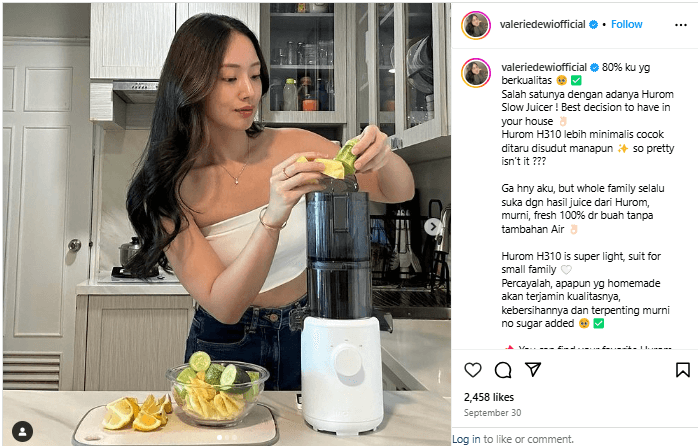
7. Content Creation and Repurposing
Influencers produce fresh, engaging content that effectively resonates with their audiences.
This content is tailored to the interests and preferences of specific demographics, which makes it highly relevant and impactful.
Leveraging the creativity of influencers, you can tap into new ideas and perspectives that might not emerge from traditional marketing teams.
Below are key ways that influencer content can drive engagement and enhance brand visibility:
- New content for audiences: Influencers provide unique content that captures the attention of their followers. This creativity engages the audience and enhances brand visibility across social media platforms.
- Content repurposing: You can strategically repurpose influencer-generated content across various marketing channels. This approach maximizes the ROI by extending the lifespan of the content.
- For example, posts created for Instagram can be adapted for use in email newsletters, blog articles, or even advertisements. This ensures consistent messaging across platforms while saving time and resources.
8. Increased Engagement and Dynamic Content Creation
Influencer campaigns achieve an average engagement rate of 4.2%, which is higher than that of traditional advertising methods.
This demonstrates the effectiveness of influencer marketing in capturing audience interest and driving interaction.
- Creativity and authenticity: Influencers showcase products or services in a relatable context by blending them seamlessly into their everyday lives. This genuine approach builds a connection with followers and encourages participation through comments, likes, and shares.
- Multiple touchpoints: Influencer content can touch various stages of the marketing funnel, from awareness to conversion. This versatility ensures that brands maintain a presence across different consumer interactions, which enhances the likelihood of engagement throughout the customer journey.
- Interactive formats: Many influencers use interactive content formats, such as polls, Q&A sessions, and live streams, which invite followers to engage directly.
- For instance, some influencers generate buzz around a product through entertaining unboxing videos, followed by in-depth product reviews that provide insights into its benefits. This journey continues as influencers share discount codes or affiliate links to prompt followers to make purchases.
Below is an example of an affiliate referral program for influencers offered by Hopper, one of our clients.
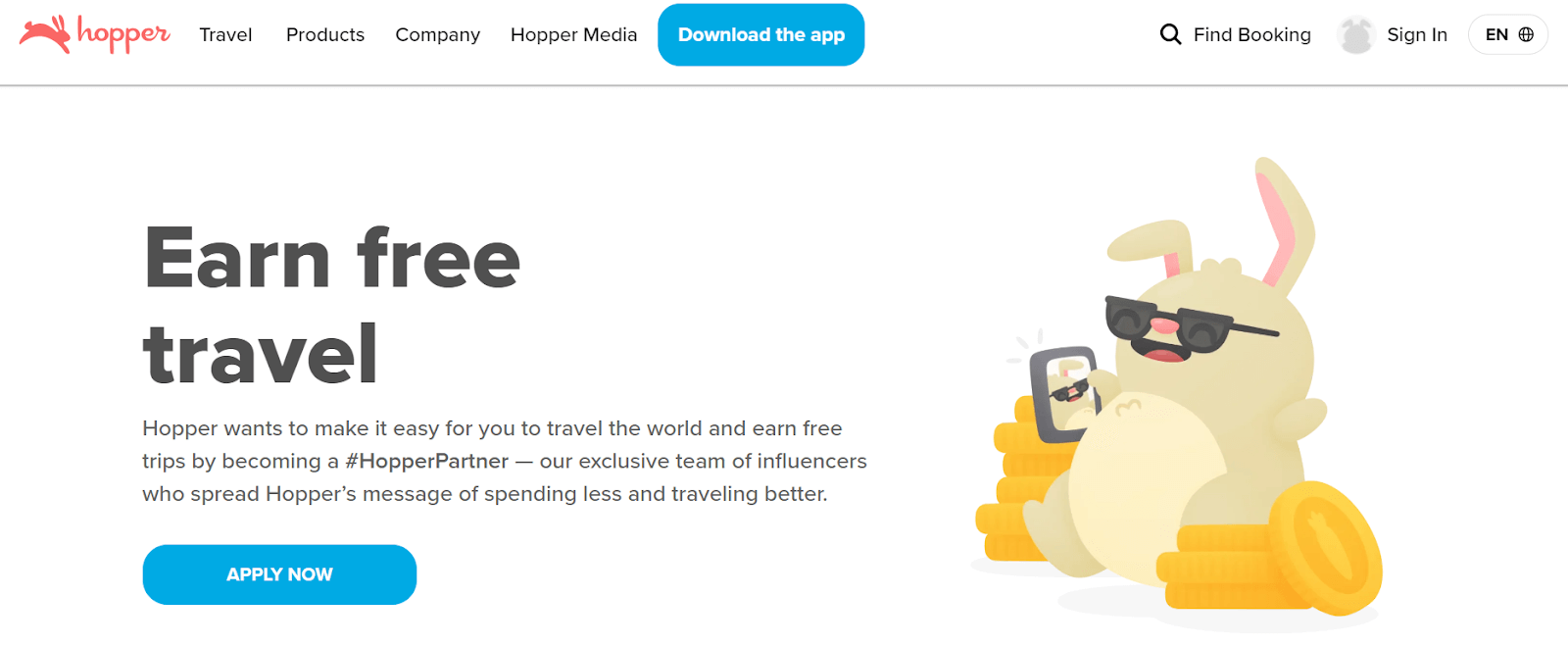
9. SEO and Online Traffic Boost
Influencer marketing can significantly improve a brand's SEO and drive more traffic to its website.
Partnering with credible influencers helps enhance visibility and online presence.
Some key ways by which influencer partnerships can boost SEO and online traffic are:
- Backlinks and authority: When influencers link to your website in their content, it drives targeted traffic. It also signals to search engines that your site is trustworthy, which in turn boosts your SEO.
- Keyword optimization: Influencers can create content with relevant keywords that align with your brand. This can increase visibility in search engines and improve rankings for those terms.
- Social signals: Engaging influencer campaigns leads to increased social interactions, which indirectly benefits SEO. While social shares don't directly improve rankings, they can drive more traffic to your site. Thus leading to additional searches and interest.
10. Better Understanding of the Audience
Influencer marketing helps you understand your target demographics better than you ever could by yourself.
Influencers help you gain a deeper understanding of consumer preferences, behaviors, and needs. These collaborations offer a window into audience trends, enabling more effective marketing strategies.
Following are the ways influencer marketing enhances audience understanding:
- Demographic insights: Influencers often have access to detailed analytics about their followers, including age, location, interests, and engagement patterns. The point is to refine your target audience segmentation. Study shows that 31% of social media users discover new products through influencers. This indicates their significant role in reaching specific demographics.
- Content performance feedback: Influencer campaigns provide direct feedback on what content resonates best. The audience’s reactions, likes, comments, and shares help brands identify what type of messaging is most effective.
- Behavioral trends: Observing how followers engage with influencer content allows brands to understand purchasing habits, seasonal preferences, and peak interaction times. Leverage this data to optimize your other campaigns and scale your marketing efforts.
The Future of Influencer Marketing: Here’s Our Expert Take
The influencer marketing industry is rapidly evolving, driven by new tech, consumer expectations, and new platforms coming out.
Key trends include:
- Rise of AI and virtual influencers: AI-powered virtual influencers offer brands consistent messaging and fewer logistical challenges. These digital personalities allow brands to reach audiences in innovative ways while providing greater control over content and interactions.
- Focus on micro and nano-influencers: Brands are increasingly partnering with smaller influencers, known for higher engagement and authentic connections. These influencers offer a budget-friendly option and resonate with niche audiences, which makes them ideal for targeted campaigns.
- Greater emphasis on authenticity: As audiences seek genuine connections, influencers prioritizing transparency and authenticity will continue to thrive. This shift pushes brands to collaborate with influencers who reflect relatable and trustworthy voices.
- Increased regulation and ethical standards: Stricter guidelines are shaping the industry to ensure transparency in sponsored content, from clear disclosures to ethical practices, preserving trust in influencer marketing.
- Diversification across platforms: Platforms like TikTok and other niche communities are becoming more important as brands tailor their strategies to reach specific demographics and interests. This shift allows brands to stay relevant and connect with audiences where they’re most active.
Maximize Your Brand’s Impact with inBeat’s Influencer Marketing Expertise
Influencer marketing improves brand awareness, drives purchase decisions, and builds long-term loyalty.
As brands adapt to changing trends and consumer expectations, influencer marketing will likely play an even larger role in shaping brand perception and customer engagement.
Key takeaways:
- Influencer marketing leverages influencers’ credibility and reach to target specific audiences.
- Influencers build trust through relatable and genuine content, which helps audiences view endorsed products as credible and trustworthy.
- Effective influencer partnerships can generate high returns, with brands often seeing strong engagement and quality leads through these collaborations.
- Micro-influencers can engage niche audiences well and provide brands with targeted exposure within a budget-friendly framework.
- Influencers offer access to highly specific interest groups, which helps brands reach audiences with unique preferences.
- Influencers are pivotal in consumer buying behavior, especially for younger demographics who value their recommendations.
- Long-term relationships with influencers, such as ambassadorships, strengthen brand loyalty and reinforce consistent messaging.
- Influencers produce creative content that can be repurposed across multiple channels, extending its value for brands’ marketing efforts.
If you’re looking to scale your brand with effective influencer strategies, inBeat Agency can help. Our expertise in influencer marketing spans from targeting niche audiences to driving measurable results with engaging, user-generated content.
Partner with us to build tailored influencer campaigns that align with your brand goals and connect meaningfully with your audience.





.svg)
.svg)
.svg)
.svg)


.svg)







